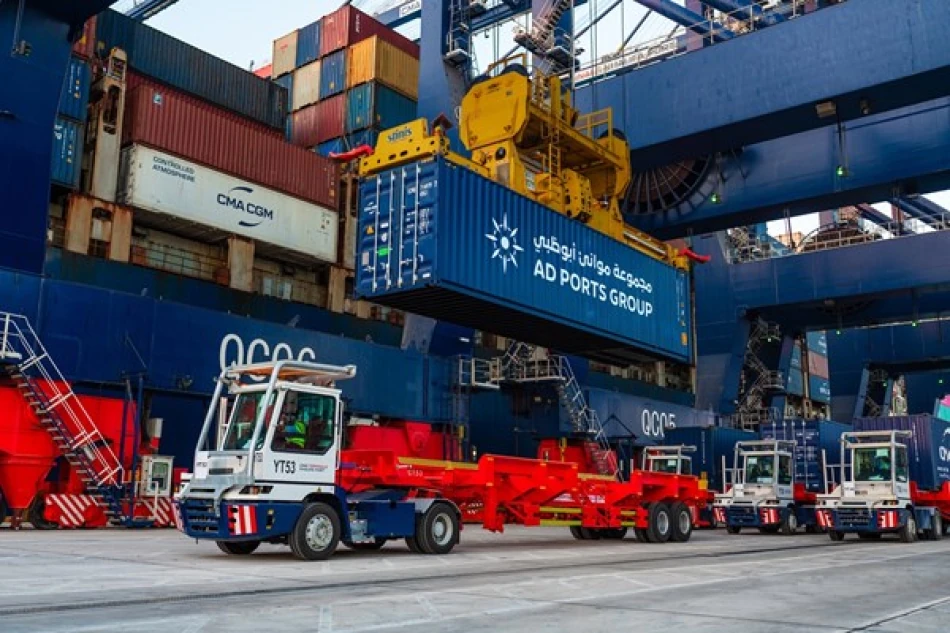
Abu Dhabi Ports Revenues Surge 15% to $1.3B in Q2
Abu Dhabi Ports Surges 15% as Global Trade Routes Shift Through Red Sea Crisis
Abu Dhabi Ports Group has capitalized on global supply chain disruptions to deliver robust Q2 2025 results, with revenues jumping 15% year-on-year to AED 4.83 billion. The UAE logistics giant is successfully converting geopolitical turbulence into commercial opportunities as shipping companies seek reliable alternatives to traditional trade routes through the Red Sea.
Strong Performance Across Core Segments
The company's integrated business model proved its resilience during a period of significant global trade disruption. EBITDA rose 9% to AED 1.17 billion, maintaining a healthy margin of 24.2%. While net profits remained relatively stable at AED 445 million due to higher depreciation and financing costs, the underlying operational strength was evident across all major divisions.
Container handling volumes surged 17% year-on-year, while general cargo increased 13%. The newly operational CMA Terminals Khalifa Port, which began commercial operations in early 2025, achieved an impressive 80% capacity utilization rate in Q2, demonstrating rapid market adoption.
Capital Efficiency Improves
Capital expenditure intensity continued to decline, dropping to 19% of revenues from 28% in Q2 2024. This improvement, combined with strong operational performance, generated a 97% cash conversion rate and doubled operating cash flow to AED 1.14 billion compared to the same period last year.
Benefiting from Global Trade Route Diversification
Abu Dhabi Ports is strategically positioned to benefit from the ongoing reconfiguration of global trade flows. Regional container shipping volumes increased 34% year-on-year, reflecting the company's success in capturing diverted cargo as international shipping lines seek stable alternatives to Red Sea routes.
This trend mirrors similar benefits seen by other regional logistics hubs, but Abu Dhabi's integrated approach—combining ports, free zones, maritime services, and economic cities—provides a competitive advantage in offering comprehensive solutions to global shippers.
Economic Cities and Free Zones Expansion
The company leased an additional 600,000 square meters during Q2, bringing total land leased since the beginning of 2025 to 1.6 square kilometers. Occupancy rates in Sedera Group's residential units improved significantly to 80%, up from 63% in Q2 2024, indicating strong demand for integrated logistics and residential solutions.
Strategic Positioning for Long-Term Growth
Captain Mohamed Juma Al Shamisi, CEO of Abu Dhabi Ports Group, emphasized the company's ability to transform external challenges into business opportunities. The group's expansion into Central Asia and development of alternative trade corridors positions it well for continued growth as global supply chains undergo structural changes.
Market Implications
For investors, Abu Dhabi Ports represents a compelling play on the structural shift in global trade patterns. Unlike pure-play port operators, its integrated model provides multiple revenue streams and natural hedges against cyclical downturns. The company's strong cash generation and improving capital efficiency suggest potential for enhanced shareholder returns.
The results also underscore the UAE's broader strategy to position itself as a critical node in global supply chains, particularly as traditional routes face ongoing disruption. With earnings per share stable at AED 0.07 and positive free cash flow, the company appears well-positioned to continue its international expansion while maintaining financial discipline.
Most Viewed News

 Layla Al Mansoori
Layla Al Mansoori






